

Retail Property Outlook - 2021. Global Employment Trends for Youth 2020: Youth exclusion from jobs and training on the rise. GENEVA (ILO News) – The number of young people currently not in employment, education or training (NEET) is rising, and young women are more than twice as likely as their male counterparts to be affected, according to a new International Labour Organization (ILO) report.
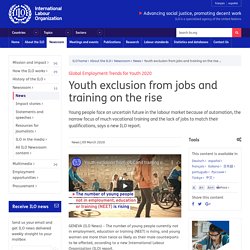
Young people (those aged 15-24) who are employed also face a greater risk than older workers of losing their jobs because of automation, and those with vocational training are particularly vulnerable, the report shows. “This reflects how the occupation-specific skills imparted by vocational training tend to become obsolete faster… than general education skills,” the report says.
It calls for vocational training programmes to be revised and modernized so that they meet the changing demands of the digital economy. The latest Global Employment Trends for Youth 2020: Technology and the future of jobs (GET Youth 2020) shows that, since the previous GET Youth report in 2017, an upward trend in NEET status has emerged. Portal of Public Use Datasets on Sub-Saharan Africa. This data portal was created by the NBER Africa Project, co-directed by Sebastian Edwards, Simon Johnson, and David N.
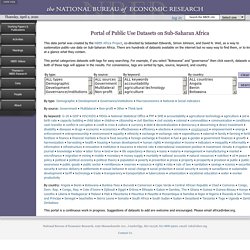
Weil, as a way to systematize public-use data on Sub-Saharan Africa. There are hundreds of datasets available on the internet but no easy way to find them, or to know at a glance what they contain. This portal categorizes datasets with tags for easy searching. For example, if you select "Botswana" and "governance" then click search, datasets with both of those tags will appear in the results. For convenience, tags are sorted by type, source, keyword, and country. By type: Demographic • Development • Governance/institutions • Macroeconomics • National • Social indicators By source: Government • Multilateral • Non-profit • Other • Think tank By country: Angola • Benin • Botswana • Burkina Faso • Burundi • Cameroon • Cape Verde • Central African Republic • Chad • Comoros • Congo, Dem.
This portal is a continuous work in progress. Africa's Top Companies By Region in 2019 - African Business Magazine. North Africa – Egyptian companies score biggest increase in rankings Market capitalisation for the region is down to $98bn or 13% of the total, with the bulk of the market capital supplied by the Bourse de Casablanca in Morocco and the Egyptian Exchange.
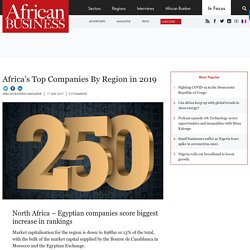
Both the Egyptian Exchange EGX30 and Morocco’s MASI Free Float indices are down by about 16% in local currency over the year to March 2019. The outlook for Egypt is particularly positive, with stockbroker Exotix forecasting higher economic growth (GDP) than in 2018, and lower inflation, interest rates and deficit in the current account. According to the International Monetary Fund (IMF), the prospects for Egypt’s economy are good with real GDP growth of 5.5% forecast this year, rising to 6% by 2024. Egypt scored the biggest increase with its share of the top 250 ranking rising from 34 companies in 2018 to 39 this year.
Many Egyptian companies scaled the rankings including hotels, banks, food, real estate, capital markets and telecoms. World Economic Outlook. A Survey by the IMF staff usually published twice a year.
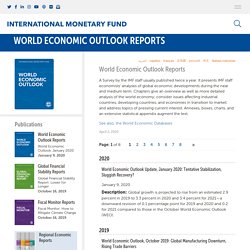
It presents IMF staff economists' analyses of global economic developments during the near and medium term. Chapters give an overview as well as more detailed analysis of the world economy; consider issues affecting industrial countries, developing countries, and economies in transition to market; and address topics of pressing current interest. Annexes, boxes, charts, and an extensive statistical appendix augment the text. Doing Business 2020: Two Sub-Saharan African Countries among Most Improved in Ease of Doing Business. WASHINGTON, October 24, 2019 – Economies in Sub-Saharan Africa continued to improve their business climates, with the region’s largest economy, Nigeria, earning a place among the year’s top global improvers alongside Togo, according to the World Bank Group’s Doing Business study.
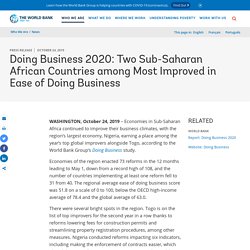
Economies of the region enacted 73 reforms in the 12 months leading to May 1, down from a record high of 108, and the number of countries implementing at least one reform fell to 31 from 40. The regional average ease of doing business score was 51.8 on a scale of 0 to 100, below the OECD high-income average of 78.4 and the global average of 63.0.
There were several bright spots in the region. Togo is on the list of top improvers for the second year in a row thanks to reforms lowering fees for construction permits and streamlining property registration procedures, among other measures. Elsewhere, Cabo Verde and Eswatini each carried out four reforms, a record for both. African Economic Outlook 2020: Developing Africa’s workforce for the future. AFR Regional Economic Outlook. AFDB Socio Economic Database, 1960-2019 - Africa Information Highway Portal. Top 500 companies. Search Database Query.